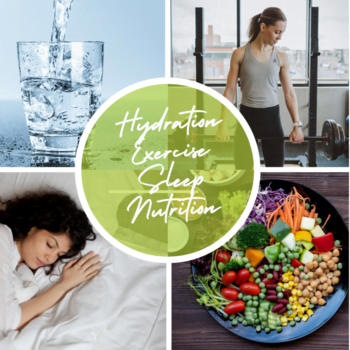
There are 4 key elements that create the optimal environment for injury recovery. We’ve all been told a million times to stay hydrated, exercise, get a good night’s sleep, and eat a variety of fresh, non-processed foods. But have you ever considered how those things can impact your ability to heal from an injury? Especially those injuries more chronic in nature that maybe don’t seem to be responding to the treatment plan laid out by your doctor or Physiotherapist.
Let’s talk about how creating consistency with the basics can give your body a boost when it needs it the most.
Water
There are three stages of tissue repair following an injury:
- Inflammation
- Proliferation
- Remodeling
In order for your body to properly move through each stage of healing, it needs fluid, oxygen, and nutrients. When you are adequately hydrated, your body has the capacity to send those fluids, nutrients, and oxygen to the injured tissue to stimulate healing. Unfortunately, dehydration can lead to cellular death, poor scar tissue formation, and collagen that is stiff & restricted.
How much water you should be drinking will vary from person to person. But drinking until your urine is clear and odourless is a good rule of thumb.
Exercise
Movement is a catalyst to stimulate tissue healing.
Often your exercise regime is impacted when you’re injured. And although modifications to exercises and changes to your regime are often needed to allow for tissue recovery, full rest from all activities is rarely indicated.
Movement improves blood flow. And as stated above, blood flow drives oxygen and nutrients to the injured areas. Movement is a catalyst to stimulate tissue healing. This is why you will often walk away from your first appointment with a Physiotherapist with a full exercise sheet in hand!
Sleep
Human growth hormone (HGH) is a hormone produced naturally in the body by your pituitary gland. It plays an important role in muscle growth & strength, cell repair, and your metabolism. Therefore optimal levels of HGH are instrumental in healing from an injury.
When we sleep, more specifically when we enter the deep cycle of our sleep, HGH is released to stimulate muscle repair and growth. Therefore, getting yourself into a consistent routine before bedtime, such as reading a book, avoiding blue light exposure, avoiding caffeine late in the day, and optimizing your environment, can assist you in getting the adequate amount of sleep to enhance your body’s HGH production.
Nutrition
Remember those 3 stages of healing? Inflammation, proliferation, and remodelling? What we choose to fuel our bodies with during each stage can highly impact its ability to heal.
Highly processed foods, added sugars & refined carbohydrates, and alcohol all have the ability to increase your inflammation. So during the inflammatory stage of injury, consider reaching for anti-inflammatory foods such as garlic & turmeric, healthy fats high in omega 3s such as salmon, flax, chia, hemp and walnuts, and foods rich in antioxidants like berries. Upping your intake of protein during this time to help build and repair muscle and incorporating foods that are high in vitamin C, vitamin A, and zinc can also be beneficial for healing.
As you exit the acute phase of injury and into the proliferation/remodelling stages, your body will need to continue to be fuelled in a way that supports recovery, as outlined above. One of the best ways to ensure you are getting the nutrients you need is by eating a wide variety of fresh foods. Furthermore, getting enough calories & protein for energy, and your body’s ability to rebuild and repair.
Additionally, if you’re looking for a few supplements that may help with injury recovery, try:
- Collagen
- Glutamine
- Hyaluronic acid
- Glucosamine
- Arginine
- Magnesium
- Calcium
So the next time you are injured, or if you are currently injured, consider these 4 key elements as a way of supplementing your Physiotherapy care for optimal success.
Kim Gibas
Physiotherapist at Pivotal Physiotherapy
